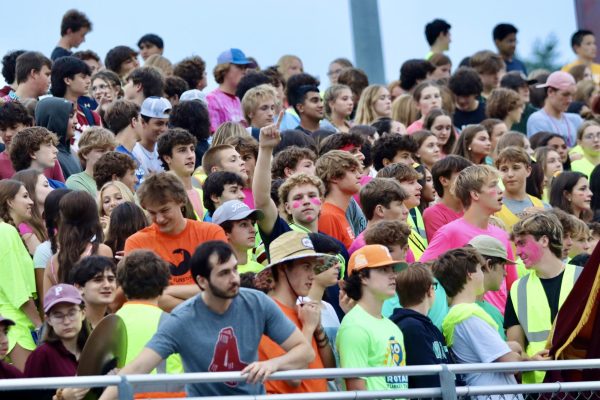Who is Portsmouth’s Biggest Rival?
High school sports and competition go hand in hand. Whether it be getting revenge against a team that beat you earlier in the season, or fighting for a starting spot on your team, competition reigns supreme. When two parties engage in a lasting competitive relationship, the conflict evolves into a rivalry.
Tom Kozikowski, the current Athletic Director and member of the Portsmouth High School athletic department for 17 years, loves rivalry. “It brings hype and excitement for any competition,” Kozikowski said.
When asked who Portsmouth’s biggest rival is, Kozikowski made an interesting note, pointing out not all Portsmouth sports are in the same division. “In Division 2, our local schools – Oyster River and St. Thomas were our biggest rivalries over that time period. In Division 1, local schools such as Winnacunnet and Dover have always been great competition,” Kozikowski said.
Rivalries exist at every level of sports and thrive in high school sports. Portsmouth plays in Divisions 1 and 2 for most sports, which tend to be composed of larger schools in New Hampshire. Many schools near Portsmouth High School also compete in these divisions, including Exeter, Dover, Oyster River, Winnacunnet, etc.
According to a study by Gavin J. Kiduff at New York University, “…rivalry occurs between people who already know each other and who take their history of past interactions into account in competition.”
Portsmouth athletics may have a more intense rivalry with schools they are familiar with. These could be nearby schools that they interact with frequently, such as Oyster River, Dover, or Exeter, or schools they may have a long history of competing with.
“Many of the players know each other from club play and that intensifies the rivalry and level of competition — they want to beat each other and have bragging rights,” Sara Carpenter, a PHS teacher since 1997 and the varsity field hockey coach since 2014 (after coaching 11 years at STA), said.
Carpenter points to Souhegan as her team’s biggest rival. “The constant head-to-head and the closeness of the game scores has led to a terrific rivalry,” Carpenter said, noting two years in a row the teams met in the playoffs, each winning once and moving on to the championship.
Senior Bennett Michaels, a self-acclaimed “Super-fan and super-interviewer” at PHS has a different perspective on this matter. As someone whose relationship with PHS athletics mostly comes from watching games, Michaels notices what coaches or athletes may not. Michaels thinks Portsmouth’s most significant rivals are the Exeter Blue Hawks, “because of how close they are to us… and how they [Blue Hawks and Clippers] historically don’t get along well.”
Rival games may be more fun to play in, or “make the student’s section a little rowdier,” according to Michaels, but they also have other benefits. Studies have shown that the presence of a rival leads to boosted performance. Runners run faster, tech giants create better products, and motivation skyrockets.
“When you know that you are facing your rival there is just an extra level of intensity that is brought to the field,” Carpenter said.
Interestingly, by analyzing NFL games, an article published by Harvard Business Report found “that rivalry between teams predicted greater risk-taking.” In this scenario, it was going for fourth downs and two-point conversions, but this most likely applies to sports outside of football. Maybe a midfielder goes for a 25-yard screecher, or a baseball player goes for a risky stolen base. During rival games, the stakes are higher, the atmosphere is more intense, games are more chaotic, and the quality of play may actually be higher and riskier.
When looking at New Hampshire High School Intercollegiate Athletic Association’s archive of state champions, rivalries at Portsmouth come down to a couple of factors: division, sport, and era. For example, from 2008-2010, Portsmouth football lost to Souhegan in the Division 3 state championship, but from 2018-2022, Portsmouth girls’ Lacrosse defeated Hollis-Brookline three times in the Division 1 state championship. In the fifties and sixties, Portsmouth and Laconia seemed to meet in the championship across many sports, but now Laconia and Portsmouth seem to be in different divisions for many sports, so the teams meet less often.
Circling back to the main question: “Who is Portsmouth’s biggest rival?”, there is no perfect answer. Some easy names to throw out are nearby schools like Exeter, Dover, Winnacunnet, Oyster River, and St. Thomas, but on the other hand, schools like Bedford, Souhegan, and Hollis-Brookline seem to consistently give Portsmouth problems in several sports. Regardless, rivalry at Portsmouth high school will live on forever and deserves to be celebrated. Go Clippers!





